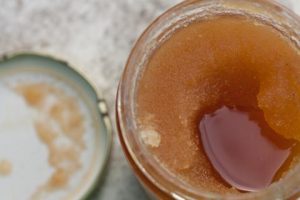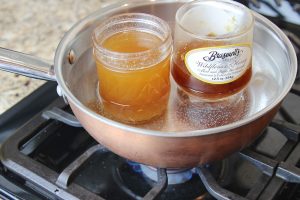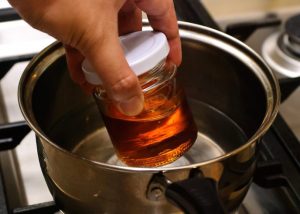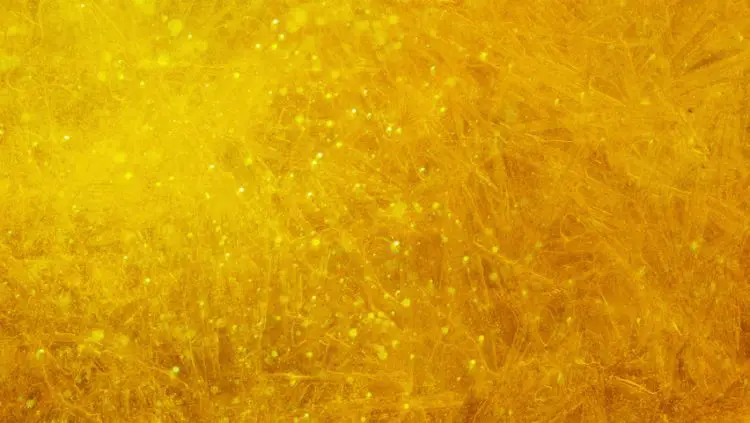Yes, honey can be frozen. It’s actually a fantastic method of storing large amounts of honey, as at appropriate temperatures, the honey won’t crystallise, bacterial growth will be inhibited, and the nutrient content and flavor won’t be affected.
Raw honey doesn’t go bad like other types of food. It has antimicrobial components and a low pH level in addition to a low level of moisture, so it maintains its quality. Freezing honey is an excellent way to keep the excess honey until it’s needed.
At room temperature, honey can be safely stored and used for years and years. If you want to store it for longer periods, you’ll need an efficient method for long-term storage. (like freezing!)
Thanks to its antimicrobial properties, a low pH level, and a low level of moisture, honey maintains its quality for a very long time. Even so, freezing honey is an excellent way to keep excess honey until it’s needed.
Freezing honey is one of the safest methods to store honey for long periods, as it doesn’t affect the nutrients or antimicrobial properties while inhibiting bacterial growth. Moreover, it won’t affect its texture or flavor.
Storing Honey Safely
Honey is tolerant of various temperatures. However, it might lose some of its properties if it’s subject to wildly varying temperatures over a short period.
Cold temperatures can make honey crystallize while hot temperatures will make it more fluid. While exposing honey to cold and hot temperatures doesn’t affect its properties, fluctuating between hot and cold will slowly change its characteristics over time.
If you live in an area or home that experiences drastic changes in temperature, freezing honey can be a great way to avoid the negative effects of these temperature swings.
What Happens When You Freeze Honey
Honey is a viscous liquid because it’s a saturated solution of sugar. It doesn’t contain much water so it won’t freeze as the temperature reaches the freezing point of water. However, as the temperature gets lower, your honey will become much more viscous.
As the temperature drops, honey goes through several phases.
Phase 1: <-20 °C: The honey stays in a liquid form but flows at a slow rate. Unlike water, the temperature of honey can drop this low and still remain viscous.
Phase 2: -20 °C to -51 °C: The honey will become a glassy transitional form between liquid and solid.
Phase 3: <-51 °C: The honey will become a glass-like amorphous solid. Here’s a video from The Action Lab, where they attempt to crush some honey that’s been cooled to this state.
Does Freezing Honey Destroy Nutrients?
No, freezing honey does not negatively affect the nutrient content, or the flavor of honey. This is one of the reasons why freezing honey is such a great method for long-term honey storage.
How To Crystallise Honey
Keeping honey between a temperature range of 11-15°C will crystallize it (as long as it’s raw, unfiltered honey). Placing the honey in a suitably cold refrigerator with a dash of water will expedite this process as crystallisation occurs when water interacts with the glucose in the honey.
This is also one of the steps for making creamed honey. Creamed honey contains a large number of small crystals, but remains spreadable. Keeping your honey at room temperature will restore crystallised honey to its liquid state.

How To Stop Honey From Crystallizing
The best way to avoid your honey from crystallising is to remember that moisture (water) and cold temperatures are the main reasons honey crystallizes. Water reacts to the glucose in the honey, forming crystals, so it’s important to keep moisture away from your honey. This process more commonly occurs at colder temperatures, but can still happen in warmer climates.
Here are some simple steps to help keep your honey from crystallizing.
 Don’t put your honey in the fridge! Your fridge is the perfect temperature to crystallize honey.
Don’t put your honey in the fridge! Your fridge is the perfect temperature to crystallize honey.
 Keep your honey in a glass jar. Glass is much less porous than plastic and will therefore keep moisture out of the honey for longer.
Keep your honey in a glass jar. Glass is much less porous than plastic and will therefore keep moisture out of the honey for longer.
 Keep a tight lid on the honey to keep particles and moisture out.
Keep a tight lid on the honey to keep particles and moisture out.
 Always use a clean, dry spoon, or whatever other kitchen implement you prefer, when taking honey from the jar.
Always use a clean, dry spoon, or whatever other kitchen implement you prefer, when taking honey from the jar.
 Put your honey jar on the top shelf of your pantry. This will most likely be the warmest place in your pantry, so will help keep the honey slightly warmer.
Put your honey jar on the top shelf of your pantry. This will most likely be the warmest place in your pantry, so will help keep the honey slightly warmer.
Sometimes you can take all the right precautions, and your honey will still crystallize. Worry not, because decrystallizing honey is actually a very simple process.
How To Decrystallize Honey
To decrystallize honey, you’ll want to place the jar of honey in a bowl, and gradually warm it up using warm, but not boiling, water. Using too much heat will negatively affect the nutrient content and flavor of the honey. Make sure that all the crystals have completely dissolved before ending this process, as the honey will rapidly recrystallize if there are any remaining crystals.

Why Should You Freeze Honey?
While honey can keep for a very long time, freezing adds an additional layer of security to the storage of honey as it’ll inhibit bacterial growth, while not negatively affecting its flavor or nutritional benefits.
This is especially important for both amateur and professional beekeepers, as honey is an important part of their hobby or livelihood. Freezing honey is a safe way beekeepers can store large amounts of honey, and while this can be expensive, avoiding large batches of honey from going bad can certainly help justify the costs.
Most freezers can keep the temperature of your honey between -4 and -20 or -30 °C, but it’s difficult to find suitable equipment that can provide stable lower temperatures.
Maintaining Your Frozen Honey
Keeping your honey at a consistent low temperature is one of the best ways to retain its nutrients and properties for a very long time. You can do so by keeping it in a freezer that is solely devoted to honey storage as you will avoid temperature drops from opening/closing the freezer door(s).
If you’ve decided to thaw your frozen honey, you shouldn’t re-freeze it. This will cause it to lose both its nutrients and its flavor.
Tips For Freezing Honey
To guarantee that your honey will keep its quality, you need to make sure it’s stored properly. Here are a few things you should keep in mind.
 Close the jar firmly before freezing the honey. This will prevent air from entering the jar. Air leads to oxidation and the eventual fermentation of honey.
Close the jar firmly before freezing the honey. This will prevent air from entering the jar. Air leads to oxidation and the eventual fermentation of honey.
 Make sure that you leave a little space in your jar because honey will expand when you freeze it. (You don’t want broken glass in your honey!).
Make sure that you leave a little space in your jar because honey will expand when you freeze it. (You don’t want broken glass in your honey!).
 Don’t open the freezer unless you absolutely have to. This will maintain the temperature level, and avoid accidentally defrosting any honey.
Don’t open the freezer unless you absolutely have to. This will maintain the temperature level, and avoid accidentally defrosting any honey.
 Use glass containers when you’re freezing honey. Plastic containers are porous and aren’t that durable. They also allow air, and therefore odors of other food items to be passed onto your honey. If you have to use a plastic container, keep it in a sealed ziplock bag.
Use glass containers when you’re freezing honey. Plastic containers are porous and aren’t that durable. They also allow air, and therefore odors of other food items to be passed onto your honey. If you have to use a plastic container, keep it in a sealed ziplock bag.
Honey storage is an important practice. Whether you’re an amateur or a professional beekeeper, or just someone who loves honey, there will be times when the amount of honey you have exceeds your needs. Freezing honey is an easy, safe way to preserve it for later use.
How Long Can You Freeze honey?
Honey can keep for a very long time, even at room temperature due to it’s very low water content and pH level, giving it its famous anti-bacterial properties. Frozen honey, clear of any contaminants should keep for 100’s if not 1000’s of years as long as the temperature remains stable. So no need to worry about if you’ve left your honey in the freezer too long!
How Do You Defrost Frozen Honey?
Freezing honey in your household fridge or freezer means that it will remain a rather viscous liquid state. If you want to reverse this process, simply put the jar of honey in a bowl of warm water. This will restore the honey to its natural liquid state.

Learn more about honey with our All About Honey section!


![3 Big Mistakes Beginner Beekeepers Make [And How To Avoid Them!]](https://beekeepingabc.com/wp-content/uploads/2020/11/3-mistakes-beginner-beekeepers-make-90x75.jpg)

![Move over ducks, Queen Bees quack too! [Here’s Why]](https://beekeepingabc.com/wp-content/uploads/2020/06/queen-bee-90x75.png)
![The Flow Hive 2 Review [ Vs. The Classic Flow Hive]](https://beekeepingabc.com/wp-content/uploads/2020/02/Flow-Hive-2-90x75.jpg)
![How Bees Fly [10 Facts About How, When, and Why]](https://beekeepingabc.com/wp-content/uploads/2019/12/A-Bee-Flying-90x75.jpg)